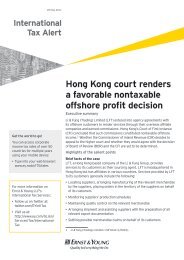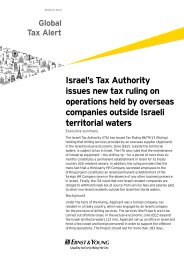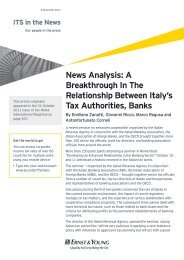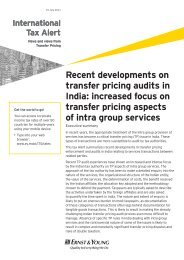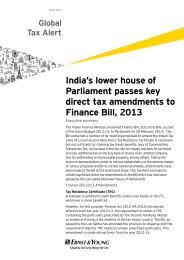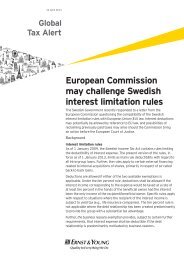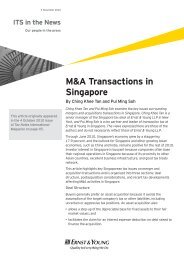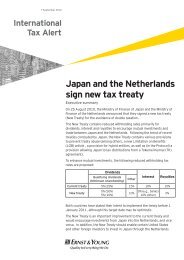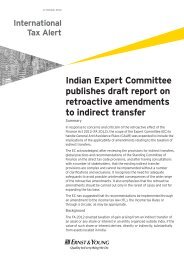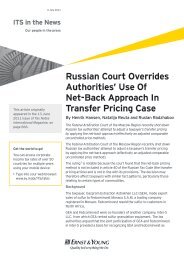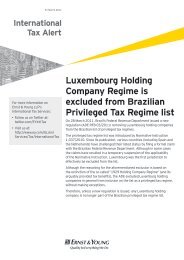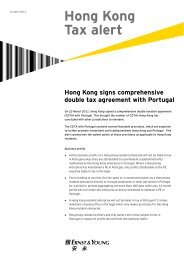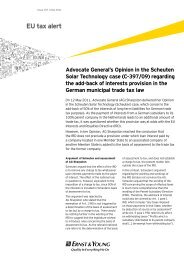MAP program report reflects increased CRA transfer pricing audit ...
MAP program report reflects increased CRA transfer pricing audit ...
MAP program report reflects increased CRA transfer pricing audit ...
You also want an ePaper? Increase the reach of your titles
YUMPU automatically turns print PDFs into web optimized ePapers that Google loves.
2<br />
significantly increase the number<br />
of agents assigned to the <strong>audit</strong> of<br />
international issues.) The number<br />
of Canadian <strong>MAP</strong> cases overall will<br />
likely also continue to increase.<br />
Timelines increasing<br />
The time required to complete<br />
these Canadian-initiated cases<br />
has <strong>increased</strong> significantly, to<br />
an average of 32.16 months,<br />
compared to 22.73 months in<br />
the prior fiscal year. This far<br />
exceeds the Canadian Competent<br />
Authority’s targeted timeline of 24<br />
months.<br />
Surprisingly, the time to complete<br />
the case preparation and evaluation<br />
phases for Canadian-initiated cases<br />
has <strong>increased</strong> to a combined 15.49<br />
months, up from approximately<br />
eight months in the prior year.<br />
Speculatively, this may be due to<br />
several factors:<br />
• Increasingly complex issues being<br />
taken on by <strong>CRA</strong> international<br />
<strong>audit</strong>ors<br />
• The Canadian Competent<br />
Authority putting more effort into<br />
shoring up Canadian assessing<br />
positions<br />
• Stretched resources in the <strong>CRA</strong>’s<br />
<strong>MAP</strong> <strong>program</strong><br />
• The statistical effects of several<br />
very old cases being concluded<br />
in the year, partly prompted by a<br />
push to resolve older Canada-US<br />
cases before they became eligible<br />
for binding arbitration under the<br />
Canada-US Tax Treaty<br />
These results suggest the Canadian<br />
Competent Authority may need to<br />
make procedural changes given<br />
the tighter timelines brought on<br />
by the advent of the US arbitration<br />
provision.<br />
Conversely, the time to complete<br />
foreign-initiated cases decreased to<br />
20.39 months from 30.53 months<br />
in 2009–10. The reasons for the<br />
decrease are unclear, but given the<br />
small number of foreign-initiated<br />
cases completed in the year, it<br />
could be the result of a few quickly<br />
concluded cases. In this respect, the<br />
current <strong>report</strong> shows a decrease in<br />
the average negotiation period by<br />
almost eight months from the prior<br />
year.<br />
Overall, the closing inventory of<br />
negotiable cases stood at 224<br />
cases at the end of the fiscal year,<br />
virtually unchanged from the 225<br />
cases at the end of 2009–10. With<br />
regard to <strong>transfer</strong> <strong>pricing</strong> cases,<br />
however, which represent the<br />
majority of the <strong>MAP</strong> cases, the<br />
ending inventory actually <strong>increased</strong><br />
from 188 in 2009–10 to 194, with<br />
80 new cases accepted but only 74<br />
completed.<br />
A higher percentage of cases<br />
did not receive relief from<br />
double taxation<br />
Of the 95 cases negotiated with<br />
other jurisdictions, 13 (14%) did<br />
not obtain complete relief from<br />
double taxation. This is a somewhat<br />
higher percentage than usual, as<br />
rates below 10% have historically<br />
prevailed. In 2009–10, only three<br />
such cases were <strong>report</strong>ed.<br />
Of the 13 cases in 2010–11, it<br />
appears that only two would fall<br />
into the category of the respective<br />
competent authorities being unable<br />
International Tax Alert Transfer Pricing<br />
to come to an agreement, while<br />
the other 11 cases failed to receive<br />
relief for a variety of what might<br />
be described as technical reasons,<br />
such as improper notification,<br />
exceeding time limits, or procedural<br />
limitations. These latter cases<br />
particularly exemplify the need for<br />
taxpayers to pay close attention<br />
to the process and technical<br />
requirements of the Income Tax<br />
Act and applicable tax treaties<br />
as they move along through the<br />
dispute resolution process in order<br />
to fully protect their rights and<br />
maintain the highest probabilities<br />
of obtaining relief from double<br />
taxation. Presumably all of these<br />
cases arose in situations where<br />
arbitration was not available.<br />
Significant increase in nonnegotiable<br />
<strong>MAP</strong> cases<br />
The <strong>report</strong> indicates the Canadian<br />
Competent Authority resolved<br />
649 non-negotiable <strong>MAP</strong> cases<br />
compared to 333 such cases in<br />
2009–10. Non-negotiable cases<br />
are those that do not require the<br />
Canadian Competent Authority to<br />
negotiate with another jurisdiction,<br />
and usually pertain to excess<br />
withholding tax.<br />
The <strong>report</strong> does not provide an<br />
explanation for the increase except<br />
to say the situation is not expected<br />
to persist. From this, we speculate<br />
the bubble in non-negotiable<br />
cases relates largely to reduced<br />
withholding rates for interest<br />
payments under the Canada–US<br />
Tax Treaty brought in by the Fifth<br />
Protocol for 2009 and 2010—where<br />
payers did not withhold at reduced<br />
rates and recipients applied for



